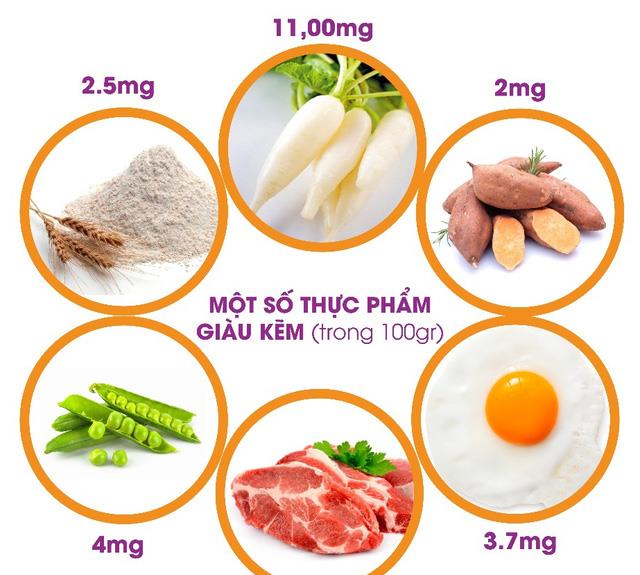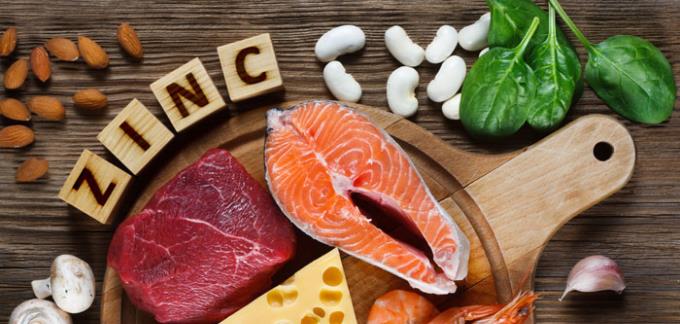Zinc is involved in enzyme formation and protein metabolism. It promotes children's growth and development. Therefore, zinc supplementation for children is very important. Zinc deficiency is also a cause of bone development disorders and delayed puberty in children.
content
Effects of zinc on the health of children
Zinc requirements according to children's developmental age
Causes of zinc deficiency in children
Zinc supplements for children like?
Zinc supplements for children
Give your baby zinc at any time of the day?
Zinc for children is what kind?
Risk of zinc deficiency
In the first 3 months of life, equivalent to each kg of their weight, babies need 120-140 mcg of zinc. This demand tends to increase more rapidly during puberty.
Effects of zinc on the health of children
Zinc participates in many enzymes in the body, increases protein synthesis, cell division, promotes growth, increases appetite, so it is very important for children.
Zinc stimulates the activity of about 100 enzymes, which are catalysts of biochemical reactions in the body.
It helps develop and maintain the effective functioning of the immune system, is essential for defending the body against disease, healing wounds, protects taste and smell and is essential for synthesis. DNA.
Lack of zinc, the metabolism of taste cells is affected, causing anorexia due to taste disturbances. The body will also slow down and stop growing, and cell division will be difficult, so it will severely affect growth.

If you want your baby to grow up quickly, remember to add zinc to your baby's daily menu!
Children with zinc deficiency are often anorexia, stunted and slow to grow. Zinc supplementation for stunted (underdeveloped) malnourished children has a pronounced restorative effect in both height and weight growth, increasing the concentration of hormone IGF-1, a factor vital growth of the body.
According to research by author Castillo - Duran, zinc supplementation for babies born at low birth weight for babies showed good growth in height and weight in the first 6 months of life.
So in order for the baby to have a good height, in the mother's diet from pregnancy to the diet of the baby after birth, there must be enough zinc.
Not only has effects on the physical, zinc deficiency also adversely affects the spirit, causing irritability. The reason is that zinc helps to transport calcium into the brain, which calcium is one of the important substances that help stabilize nerves.
Zinc requirements according to children's developmental age
Depending on a child's age, zinc requirements may also vary.
Children aged 0-6 months: 2mg / day
Children 7-11 months: 3 mg / day
Children from 1-3 years old: 3mg / day
Children aged 4-8 years: 5mg / day
Children 9-13 years: 8 mg / day
From 14 years and older: While boys need about 11 mg / day, girls need around 9 mg / day.
However, in the best conditions, the baby can only absorb about 30% of the zinc content. The rest will be "pushed" out through the intestinal fluid, pancreatic juice, urine and sweat.
Therefore, if you do not pay attention, it is easy for the mother to make the baby lack zinc because the daily diet does not meet the baby's needs.

Children of any age need zinc supplements to develop
Causes of zinc deficiency in children
Particularly for children often anorexia, moreover, children's diets are not rich. Moreover, due to improper food preparation, zinc content is lost in food.
In addition, children often suffer from childhood infections (cough, respiratory infections in children , diarrhea ...) to use many antibiotics, leading to a decrease in zinc content in the child's body ...
Zinc supplements for children like?
According to nutrition experts, to supplement zinc for the mother's body, the baby should eat foods rich in zinc such as: oysters, clams, clams, lean red meats (pigs, cows), coarse grains and legumes. Fish, vegetables and fruits also contain zinc, but not by much.
For babies and young children, mothers should breastfeed for at least the first 6 months of life to be able to supplement the necessary amount of zinc. Because compared to formula and milk, the amount of zinc in breast milk is much more easily absorbed.
In addition, to increase the ability to absorb zinc, mothers should also add vitamin C to the baby.

5 common infant diseases, the sooner the mother finds it, the easier it is to cure. In the neonatal period, the child's resistance and immune system are still extremely immature. Taking advantage of this "opportunity", there are many types of bacteria and viruses that easily attack and enter the child's immature body, causing a number of common newborn diseases.
For malnourished children
Assoc.Prof.Dr Nguyen Thi Lam - Former Deputy Director of the National Institute of Nutrition, said that mothers can supplement zinc for children through zinc-rich foods daily such as:
Shrimp, eel, oysters, oysters, pig liver, milk, beef, egg yolks, fish, soybeans, oily seeds (almonds, cashews, peanuts), copra, sweet potato ...
For children anorexia
Zinc deficiency also leads to anorexia and loss of appetite in children. Supplementing with zinc for your baby from their favorite foods such as dark chocolate, dairy, whole grains, seafood ... will help your child improve his or her health and eat better.
For babies
For children under 6 months, the best and most easily absorbed source of zinc is breast milk. However, the amount of zinc in breast milk will decrease over time.
Therefore, mothers need to maintain the amount of zinc in milk as well as supplement zinc through snacks to ensure children's development.
Zinc supplements for children
Zinc is abundant in animal origin foods. Plant-based foods are usually low in zinc and have a low biological value because they are difficult to absorb.
Animal sources of zinc include oysters, oysters, beef, sheep, chickens, lean pigs, milk, eggs, fish, shrimp, and crabs.
And plant-based foods such as wheat germ, pumpkin seeds, cocoa and chocolate, nuts (especially cashews), mushrooms, beans, almonds, apples, green tea leaves ... can be added. zinc for baby.

Zinc supplements are varied and plentiful
Give your baby zinc at any time of the day?
Because daily zinc intake is needed to maintain healthy levels in the body, when a baby shows or is at risk of zinc deficiency, this trace mineral supplement is essential.
To add zinc for the body to absorb well, you should give your baby zinc 30 minutes after meals and the supplementation time is 2-3 months then stop. When your baby takes zinc, you can add vitamins A, C, and B6 because these substances have the ability to increase zinc absorption.
Zinc for children is what kind?
You can get more zinc with medications that are available at many drug stores. However, supplementing with zinc-rich foods on a daily basis will have better results than taking medications.
For babies and young children, mothers should breastfeed for at least the first 6 months of life to be able to supplement the necessary amount of zinc. Because compared to formula and milk, the amount of zinc in breast milk is much more easily absorbed.
In addition, to increase the ability to absorb zinc, mothers should also add vitamin C to the baby.

Food remains the safest and most effective source of zinc supplements
Risk of zinc deficiency
Participating in the process of forming enzymes and protein synthesis of the body, zinc has a direct influence on the development of weight and height of children.
According to many studies, the addition of zinc in the daily diet will help children significantly improve their weight and height.
Thanks to zinc, the activity of immune cells in the body is also enhanced, helping the wound to heal faster.
Accordingly, zinc deficiency can adversely affect the development of immune cells, increase the risk of infections, acute diarrhea, respiratory infections ...
In addition, zinc deficiency affects the function of taste cells, which can lead to anorexia due to taste disturbances.

How to supplement calcium for babies to help get the best absorption Calcium plays an important role in the development of babies. Lack of calcium, children will have rickets, slow growth and affect the later stages of development of the baby. So, what is the most effective way to supplement calcium for babies?
When the child has prolonged diarrhea, poor resistance ... the mother should add zinc to the child (the World Health Organization - WHO has included zinc in the diarrhea treatment regimen next to Oresol electrolyte water).
Zinc has the effect of accelerating the regeneration of the mucosa, increasing the amount of enzymes in the brush edge of intestinal cells, increasing cellular immunity, and secreting antibodies to help reduce the incidence and severity of infections. reduce child mortality.

















